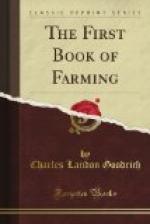CLASSIFICATION OF MANURES AND FERTILIZERS
Manures may be classified as follows:
{ Barn or stable manures,
Farm manures. { Green-crop manures,
{ Composts.
Commercial { Materials furnishing nitrogen,
fertilizers { " "
phosphoric acid,
or artificial { " "
potash,
manures. { " "
lime.
IMPORTANCE OF FARM MANURES
Of these two classes of manures the farmer should rely chiefly on the farm manures letting the commercial fertilizers take a secondary place because:
Farm manures are complete manures; that is they contain all the necessary elements of plant food.
Farm manures add to the soil large amounts of organic matter or humus.
The decay of organic matter produces carbonic acid which hastens the decay of mineral matter in the soil and so increases the amount of available plant food.
The organic matter changes the texture of the soil.
It makes sandy soils more compact and therefore more powerful to hold water and plant food.
It makes heavy clay soils more open and porous, giving them greater power to absorb moisture and plant food. This admits also of better circulation of the air in the soil, and prevents baking in dry weather.
Farm manures influence all of the conditions necessary for root growth while the commercial fertilizers influence mainly the plant food conditions.
The farm manures are good for all soils and crops.
They are lasting in their effects on the soil.
BARN OR STABLE MANURE
Barn or stable manure consists of the solid and liquid excrement of any of the farm animals mixed with the straw or other materials used as bedding for the comfort of the animals and to absorb the liquid parts.
The liquid parts should be saved, as they contain more than half of the nitrogen and potash in the manure.
The value of barn manure for improving the soil conditions necessary for root growth depends in a measure upon the plant food in it, but chiefly upon the very large proportion of organic matter which it contains when it is applied to the soil.
These factors are influenced somewhat: by the kind of animal that produces the manure; by the kind of food the animal receives; by the kind and amount of litter or bedding used; but they depend particularly on the way the manure is cared for after it is produced.
LOSS OF VALUE
Improper care of the manure may cause it to diminish in value very much.
Loss by leaching.
If the manure is piled against the side of the stable where water from the roof can drip on it, as is often the case, or if it is piled in an exposed place where heavy rain can beat on it, the rain water in leaching through the manure washes out of it nitrogen and potash, which pass off in the dark brown liquid that oozes from the base of the pile.




